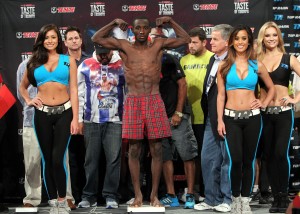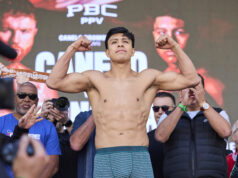By Bart Barry-

After nine years of sitting ringside at Top Rank shows – my first media credential came from Lee Samuels, in April 2005 – one flatters himself to think he can discern the difference between a well-built fight and a well-built fighter, noting hallmarks of the promoter’s extraordinary eye for talent and talent for matchmaking in the differences between a well-built fight like Donaire-Montiel and a well-built fighter like Miguel Cotto. In Dallas one year ago to see Mikey Garcia continue his ascent, while actually witnessing its antithesis, I believed the best-built fighter I saw at American Airlines Center was not Garcia but an undefeated kid from Nebraska named Terence Crawford.
Saturday confirmed that opinion and ratified Crawford as one of the world’s two best lightweights (and if a fight’s probable aesthetics should require ambiguity, may it ever do so in the case of Crawford and Miguel Vazquez), when Crawford overcame undefeated Cuban Yuriorkis Gamboa’s initial superiority of reflex and craft to make a first defense of his world title the proper way: TKO-9. At Omaha’s CenturyLink Center, Crawford switched from orthodox to southpaw, socked Gamboa from most every direction, dropped him four times, and commanded referee Genaro Rodriguez’s mercy, in a performance that made aficionados everywhere suddenly invest in the Nebraskan’s fortunes.
Crawford-Gamboa was an excellent fight conducted near the height of boxing’s current powers, though not quite as much as HBO’s hyperbolic commentating crew proclaimed – so thrilled were they to be somewhere new in front of a spectacle competitive. Terence Crawford is a rarity among contemporary prizefighters: A talented fighter able to sell tickets at home though nevertheless willing to travel anywhere and make fight real fights against real fighters. He is a monument to how Top Rank alone can build a fighter when it wishes to, when it takes a nothing-much-to-lose approach and moves him properly, making sterner tests steadily, and giving him a chance to surprise himself and others when his moment comes.
If a prizefighter improves considerably by becoming a champion, Crawford just became better again by defending his belt before a hometown crowd. Whatever collectedness Crawford showed throughout the match and afterwards, however much the ferocity of Gamboa’s attack elevated Crawford’s demeanor in aficionados’ eyes from insipid to poised, there can be no doubt he was surprised and overjoyed by his performance and its result. Watch him immediately after being hoisted on his handler’s shoulders in the traditionally celebratory way; he begins with the menacing glare one sees predominately in staredowns and hip-hop clubs then surrenders his face to a wide and nearly disbelieving grin.
It was, in its way, a metaphor for the transition in demeanor our sport’s fans underwent these last 30 days: After a scowl-inducing opening five months, 2014 righted its course, if it didn’t fully redeem itself, with definitively heroic showings by Carl Froch, Chris Algieri, Vasyl Lomachenko and Terence Crawford, interrupted early by a coronation of sorts for Miguel Cotto, aficionados’ consensus pick for the veteran prizefighter most deserving of one. While a single stretch in a mediocre run would not save a programming regime in a meritocracy, in the current state of premium-cable programming it likely buys those running HBO Sports another year or so.
As if in late-arriving rebuttal to Showtime’s groundbreaking work with Chuck Giampa in 2012, HBO unveiled Saturday its own fan-battle and groggy-cam innovations, the former a feature in which, rather than feign objectivity at the outset, Max and Roy each pick an opposing fighter and comb a match’s every indecisive moment for evidence his fighter took it, while Jim scores their efforts and Steve agrees. Max selects the object of his greater overstatements in bygone fights, and Roy picks whichever guy resembles Roy. Perhaps the fan-battle innovation, then, marks not an innovation but a feedback mechanism: Any time Max tore his eyes from Gamboa’s spellbinding athleticism, Saturday, it meant Crawford did something exceptional, and each time Roy got Gamboa’s name right it was because the Cuban showed much heart, son.
The groggy-cam innovation, though, was exactly that: Effectively as Chuck Giampa once took Showtime viewers inside the mind of a judge so did HBO’s camerawork take subscribers inside the massively concussed brain of a nearly unconscious man in a championship prizefight. Viewers who delighted in HBO’s rope-obstructed shots in the opening rounds had no choice but to concede the close of Saturday’s main event was nigh intoxicating, if not intoxicated. After Gamboa rose from the blue mat and readied himself for his final act of self-immolation in round 9, HBO gave its viewers a jerky Omaha-crowd-as-Pacific-Ocean angle nonsensical as broadcasting a Tiger Woods sudden-death putt from the Goodyear Blimp.
Self-immolation was indeed the phrase that often came to mind while watching Gamboa in Saturday’s final rounds. Gamboa, who has been rendered HBO-camera-like just about every time a fight of his makes television, brought to mind the Mike Tyson whom Evander Holyfield stopped in their first match, though without a chin fractionally reliable as Tyson’s. Just as Holyfield weathered the initial onslaught of Tyson’s reflexive rage and raging reflexes, weathered it to remind Tyson who the physically stronger man was, so did Crawford get too close and then too far in his opening 12 minutes with Gamboa, determining what he might be missing in the Cuban’s all-offense-always style and what the consequences of his carelessness later might bring, before marching forward and imposing himself the way a man should in a confrontation.
Unlike Crawford, Gamboa had no means of countering a force that moved him backwards, asserting once more his claim on contemporary prizefighting’s largest delta between physical ability and ring IQ – that somewhat fuzzy quality one needn’t define precisely before knowing Crawford has much larger stores of it than Gamboa. More enticing, still, is this: Crawford utilized his IQ to make a wager worthy of prizefighting’s master gambler, Juan Manuel Marquez, choosing to absorb Gamboa’s overhand rights, from a southpaw stance, in the hopes of deploying his own arsenal with more devastating effect.
When such hopes find full satisfaction in an arena filled with one’s hometown fans, it’s OK to break character afterwards and smile widely, Terence. You’ve got lots of folks smiling.
Bart Barry can be reached at bart.barrys.email (at) gmail.com







